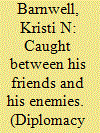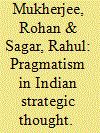| Srl | Item |
| 1 |
ID:
105222


|
|
|
|
|
| Publication |
2011.
|
| Summary/Abstract |
Early in the 1960s, the United States government saw Jordan as a useful ally but hesitated to supply the military and financial backing King Hussein requested. The Johnson administration wavered in its commitment to arm Jordan throughout the crises of the 1960s. After 1967, however, when Hussein found himself on the losing side but survived the crisis, the United States committed itself to Jordan's existence and threw its financial and political support behind him. This article draws on the LBJ Presidential Archives to examine the evolution of the Jordanian-American relationship in this turbulent decade.
|
|
|
|
|
|
|
|
|
|
|
|
|
|
|
|
| 2 |
ID:
168890


|
|
|
|
|
| Summary/Abstract |
This article recounts the author’s experience as a junior diplomat in the British Diplomatic Service in the late 1960s handling the file of Rudolf Hess, Hitler’s ex-deputy serving a life sentence in Spandau prison in Berlin. As the only Nazi leader still imprisoned there after the release in 1966 of Albert Speer and Baldur von Schirach, his fate as 'the lone prisoner of Spandau’had become an international issue. Sentenced at the Nuremberg trial of 1946, his fate was a matter for the four powers still occupying Berlin. Moscow was determined that as the last remaining symbol of the Hitler regime Hess should die there. In the West, however, and especially in Britain, there was a press campaign for his release that put pressure on the Foreign Office by way of letters from the public and parliamentary questions. As a desk officer for Germany, it fell to me to handle this by writing or drafting replies to the effect that as Hess was a prisoner of all four powers the decision required consent, that Moscow was adamantly opposed, and that Britain could not act unilaterally. But the real target of the press campaign, spearheaded by the Beaverbrook press through the Daily and Sunday Express, was Harold Wilson’s Labour Government. Anything that could demonstrate his alleged ‘appeasement’ of Moscow was grist to its mill. The now weeded file in the National Archives gives little hint of this politically-motivated agenda.
|
|
|
|
|
|
|
|
|
|
|
|
|
|
|
|
| 3 |
ID:
153037


|
|
|
|
|
| Summary/Abstract |
This article charts U.S.-Japan relations during the John F. Kennedy administration, particularly efforts to repair the U.S.-Japan alliance following massive protests in Japan against the U.S.-Japan Security Treaty. Challenging previous scholarship that minimized these efforts, I describe a fundamental reformulation of U.S.-Japan relations that continues to adhere today.
|
|
|
|
|
|
|
|
|
|
|
|
|
|
|
|
| 4 |
ID:
158428


|
|
|
|
|
| Summary/Abstract |
Although contemporary Indian strategic thought is described in terms of various schools, most scholars agree that prior to the end of the Cold War there prevailed a so-called Nehruvian consensus on India’s strategic objectives. This consensus was allegedly idealist, emphasizing autonomy, peaceful co-existence, and Third World anti-imperialist leadership. We argue that this characterization ignores numerous alternative views on Indian strategy that thrived in elite debates outside the uppermost echelons of power. Many of these views were grounded in pragmatism, or a flexible approach to considerations of power and material interest that eschewed dogmatic thinking, be it high moralism or offensive bluster. Through a case study of India’s response to China’s emerging nuclear program following the latter’s first nuclear test in 1964, we highlight the role that pragmatism played in the national debate and the way it shaped the strategic options considered by the elite at the time.
|
|
|
|
|
|
|
|
|
|
|
|
|
|
|
|
| 5 |
ID:
145210


|
|
|
|
|
| Summary/Abstract |
This article examines the conservative radio program the Manion Forum of Opinion as an important site of transnational cooperation between American conservative activists and businessmen, their allies in Latin America, Southeast Asia, and Africa. I argue that the modern American right took shape in dialogue with other kindred movements abroad.
|
|
|
|
|
|
|
|
|
|
|
|
|
|
|
|